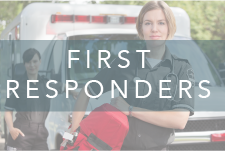Understanding the Difference
“Trauma” describes many different types of distressing events in one’s life that has a lasting negative impression and is not always limited to a single event. Anything causing a person physical or emotional harm, or leaving a person fearing for their immediate safety or life, can be traumatic.
As a result, delineating the nuances existing within trauma is important when seeking treatment.
Post-traumatic stress disorder (PTSD) is most commonly thought of when working through the complex, lingering effects of trauma. However, PTSD is not the only disorder that can follow traumatic experiences. Complex PTSD (CPTSD) is another disorder that further describes the nature of one’s trauma. Understanding the difference between PTSD vs. CPTSD can help each individual better understand their situation, symptoms, and treatment options.
What Is PTSD?
PTSD is an anxiety disorder resulting from any number of traumatic experiences throughout one’s life. These events can be physical (such as broken bones or losing a limb) or emotional (such as losing a loved one, emotional abuse, neglect, sexual abuse, or feeling abandoned in relationships). These kinds of events can happen at any stage in life, stemming from some of the earliest memories a person may have as a child or suffering from a traumatic experience during adulthood.
These traumatic events have a lasting impact on one’s mental state, and thoughts or flashbacks of traumatic experiences can invade everyday life. Trauma can rewire how an individual sees the world around them and can position a person into a constant “survival mode” in the face of these intrusive thoughts or perceived threats. This altered view of reality is difficult to process, and a single event can fundamentally change the way a person takes care of themselves, acts towards others, or structures their worldview.
What Is CPTSD?
Complex PTSD is a severe form of PTSD, though it can look similar on the surface. CPTSD is best described as a kind of PTSD that does not stem from a single event. Those suffering from CPTSD may exhibit many similar symptoms to those with PTSD, but there are also some unique hurdles they may need to overcome. The trauma experienced by these individuals isn’t linked to one experience, but rather a series of correlated or non-correlated experiences, or even a single traumatic event that stretches out over a long time.
Victims of persistent childhood neglect, physical or emotional abuse, or those who have been in long, abusive relationships may experience CPTSD. Living in violent neighborhoods where shootings are regular occurrences can also create this kind of PTSD, as well as living in an area where war is frequent. The extensive length of exposure to these traumatic experiences can make recovery difficult. However, despite the additional unique hurdles that may be present with CPTSD, recovery is still possible.
Differences Between PTSD and CPTSD
The primary difference between the two kinds of anxiety disorders related to trauma comes down to the length of one’s exposure to their trauma. The trauma associated with PTSD can take years to overcome as an individual copes with a single defining, traumatic moment or event in their lives. However, CPTSD can instead reference entire months or years of prolonged exposure to trauma and isn’t tied to one single event or date.
Both kinds of trauma need to be addressed in unique ways, and while there are similarities in the symptoms shown, there are also some differences that occur when it comes to treatment. Those who have PTSD may need to take their time to recall the traumatic events and work up to address a single traumatic moment in their lives through various therapeutic approaches. Those suffering from CPTSD may instead need to focus their energies on finding threads of consistency between traumatic experiences and how the prolonged nature of trauma has affected them over time.
Symptoms of PTSD and CPTSD
Trauma can affect people in many unique ways. While some symptoms are common throughout those suffering from trauma, not everyone will necessarily express them in the same way, whether through frequency or intensity — nor will everyone always express the same symptoms. Some potential symptoms of PTSD are:
Flashbacks
Intrusive Thoughts
Hyperarousal/Hypervigilance
Anxiety
Panic
Depression
Shame/Guilt
Feelings of Helplessness
Mood Swings/Anger
Inability to Sleep
Pervasive Nightmares
Deterioration of Trust
Isolationism
A Feeling of Emotional “Numbness”
Difficulty Concentrating
Attempts to Self-Medicate (Especially with drugs or alcohol)
These symptoms can feel like they are dictating every moment of each day, and as a result, can make it incredibly difficult to hold down jobs or establish meaningful relationships. Trauma affects every aspect of an individual’s life, either directly or indirectly, and addressing these symptoms and uncovering the source of one’s trauma is paramount for beginning to move forward through these defining times.
However, those suffering from CPTSD may have a few additional symptoms that need to address. Primarily, those with CPTSD might have difficulty understanding and regulating emotions. Prolonged exposure to trauma can make it very difficult to remember what certain emotions are even “supposed” to feel like, and the idea of “happiness” or “sadness” may become enigmatic concepts.
Emotional responses may also be exaggerated, with overwhelming anger or sadness in response to otherwise non-disastrous events. Understanding and controlling these emotions outside of one’s trauma can be challenging, making it even more difficult to get through daily practices. This, coupled with the already prevalent symptoms of PTSD, can make CPTSD a very complicated ordeal to address.
Taking a Step Towards Treatment
An individual’s journey through healing will be unique to them, and each person will respond differently to therapeutic approaches. However, there are certain practices that see great success in overcoming trauma.
Addressing CPTSD and PTSD can look fairly similar at first, with the use of individual and group therapy, social support, and establishing a safe environment all being priorities when addressing these incredibly sensitive topics. Many therapies will also involve mindfulness, or the practice of trying to understand one’s primary emotional responses better, to determine the path of one’s healing, and showcase their agency throughout the process. The use of directed medication is also an option, depending on the individual.
Somatic experiencing, a practice utilized to involve the entirety of one’s body and mind to move through trauma by understanding their inherent physical responses, is another option specifically geared towards better understanding the nature of one’s trauma, as well as how it has both physically and emotionally affected them.
Lastly, EMDR, or Eye-Movement Desensitization and Reprocessing, is another practice that can help relieve the persistent stresses and anxiety of PTSD or CPTSD to begin establishing a new homeostasis.
These options are all available to help each individual understand there is a path that can be built up for them to address the complex and difficult path of trauma recovery. PTSD and CPTSD can inhibit every aspect of an individual’s life, and learning to overcome these immensely difficult life experiences will take time. However, treatment is always available to help each person begin to understand, and move through, their unique traumas in pursuit of a healthier life.




